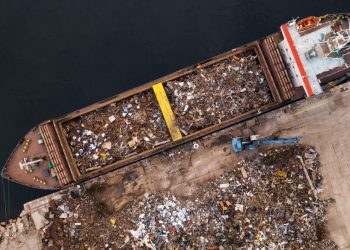According to GMS’ latest weekly ship-recycling report, as forecasted, 2025 seems to have started on an optimistic note in the ship recycling markets.
There is a noticeable willingness to buy from various buyers across the Indian sub-continent who have now seen their plots empty out amidst a decade-long dither in the supply of vessels seen across 2024. Although the turn of the year seems to be bringing in a sprinkle of optimism, there remains little to be cheery about as key economic factors affecting various ship recycling locations continue to wobble, with warring unrest raging on and primary fundamentals delivering a mix of the usual plus a sprinkle of worry, as the U.S. Dollar continues to rise against all ship recycling destinations this week.
On the back of the news of gas supply from Ukraine to the EU being cut off last week, oil exports to both winter-ridden Europe and the U.S. saw oil prices surge this week, adding another 5% and closing the week at nearly USD 74/barrel, despite ongoing demand concerns resulting from China’s economic fragility, as stimulus package concerns keep demand for oil from the world’s largest importer in check. An even colder winter is expected to keep or, worse yet, drive prices up in the near future. Additionally, after reporting a dreadful Q4 in charter rates, the Baltic Index reported a surprising gain as the week ended with a surge of about 4.2%, potentially delaying the inflow of tonnage.
Meanwhile, as reported in prior editions, news of several large LDT wet units (including those with questionable or sanctioned backgrounds) were seen making the rounds, with several VLCCs reportedly concluded over the preceding week to the few financially capable recyclers in both India and Bangladesh. Although there is a significant disparity in pricing a +40K LDT asset that requires greater financing and the ability to endure market fluctuations over longer cutting periods compared to the smaller sub-4K LDT units that have been the primary diet through 2024, stricter L/C and banking limits on larger U.S. Dollar value transactions have become notably tighter to obtain in recent years. This has exacerbated the crippling effect recyclers have faced while looking to transact, leaving otherwise busy port positions drastically empty or with bare minimum units, as further highlighted this week.
Meanwhile, progress has been made in Bangladesh over the last year in upgrading facilities ahead of the HKC’s entry into force by the middle of this year. Four yards managed to obtain their HKC approvals, with several more reportedly set to follow in the months ahead. Prices too have cooled off towards the end of 2024, and hope for increased bullishness in recycling markets once the pro-business President Trump resumes office in January remains uncertain.
India finally announced tariffs on the economic damage that cheaper imported Chinese steel has done via undercutting domestic inventories in Alang (and even Gadani) across 2024, reflected in the performance of steel plate prices at these locations. This price cooling seems to have inadvertently brought Pakistan back into the picture, as several end buyers are now raising enquiries on the marginally available units on offer, albeit at expectedly lower levels than their competitors.
At the West End, Turkey remains solidified in its economic predicaments, with no change reported this week. With supply expected to increase going into 2025 (and hopefully beyond), we may not see the deluge of vessels for recycling sales just yet, as owners continue to reap the benefits of extremely profitable years and take their older units right to the end of their trading lives.
| Rank | Location | Sentiment | Dry Bulk USD / LDT | Tankers USD / LDT | Containers USD / LDT |
|---|---|---|---|---|---|
| 1 | Bangladesh | Stable | 460 / LDT | 480 / LDT | 490 / LDT |
| 2 | India | Stable | 450 / LDT | 470 / LDT | 480 / LDT |
| 3 | Pakistan | Stable | 440 / LDT | 460 / LDT | 470 / LDT |
| 4 | Turkey | Weak | 310 / LDT | 320 / LDT | 330 / LDT |






























































